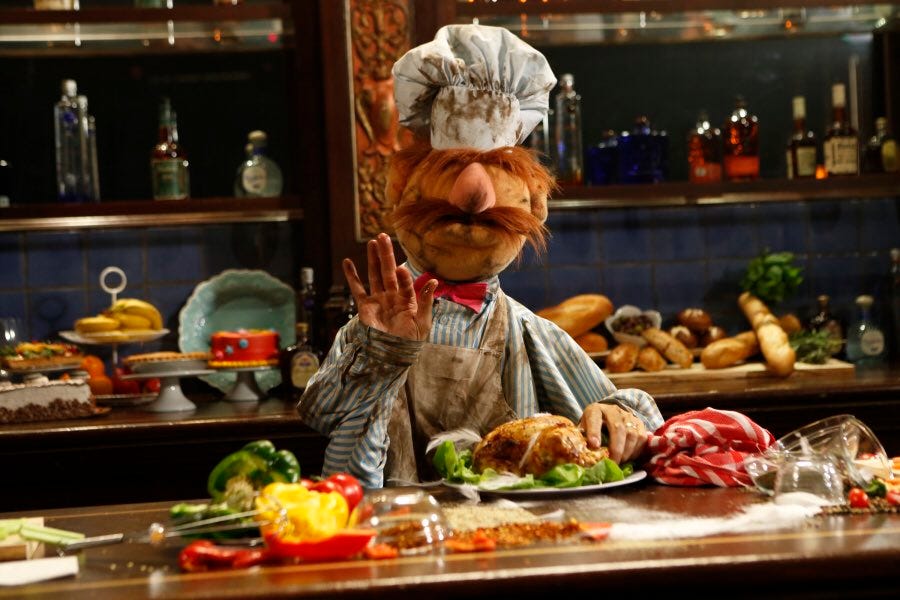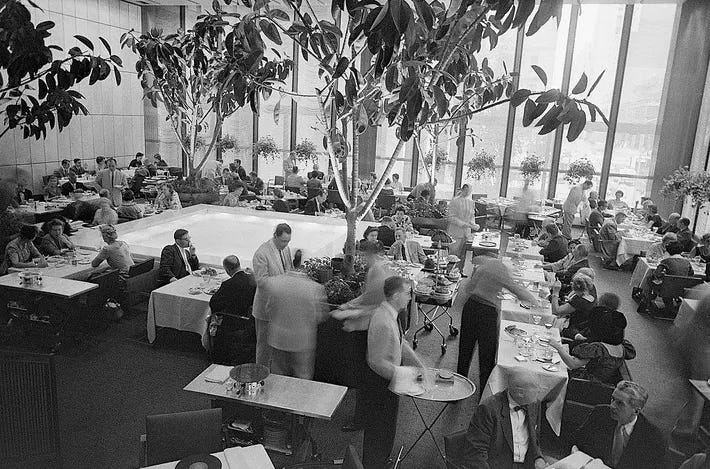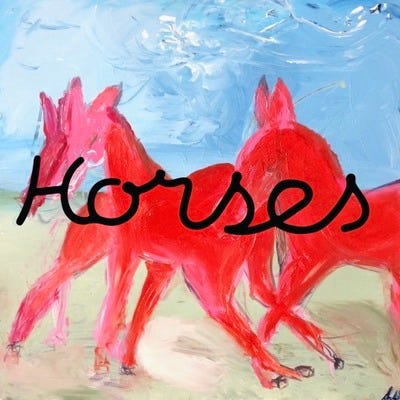Can Restaurants Survive Scandal? 🐎
If Horses endures, it could mark the end to the celebrity chef-driven restaurant era
Today, we want to talk about restaurants as brands.
But, before we begin, let’s address the horse in the room. Or, Horses, as in the LA celebrity hotspot whose owners—husband and wife (at least for now) Will Aghajanian and Liz Johnson—are embroiled in a domestic dispute that involves the alleged serial murder of cats, psychological abuse, and plenty of toxic workplace behavior. For the full debrief, packed to the gills with all the unseemly details, read this excellently reported piece on Grub Street.
Far less juicy, but no less pertinent, is this New York Times story concerning the James Beard Foundation and its new practice of investigating nominees. In a bid “to ensure that chefs with troubling histories are not honored,” some critics argue that the JBF—no stranger to scandals itself—could be stymying the recognition of traditionally marginalized chefs — the very same individuals that the recently overhauled awards show has sought to elevate. The chef as celebrity is a theme the JBF needs to uphold (no stars = no awards), and yet the crusty old non-profit continues to trip over its own shoelaces time and time again.
Since #metoo, chefs and restaurateurs have come under the cultural microscope, with many going down for good reason. We’re not here to debate that. Like most industries, as well as America itself, dining continues to grapple with a sometimes messy, sometimes deplorable past that’s included sexism, racism, abuse, and other ills.
What is up for debate, however, and what leads us back to brands and the power inherent in the best ones, is to ask: can a beloved restaurant survive a scandal, especially in an era where the Chef-as-Gastronomic God archetype continues to prevail? Is a restaurant, that is, bigger than the superstar in the kitchen?
Or superstars, as is the case with Aghajanian and Johnson. While the couple—and noted noma alums—might not be household names across the country, they’ve certainly dazzled dining enthusiasts in cities like New York and LA. Still, as is common with most celebrity-driven hotspots, where the ever elusive vibe counts more than anything else, Horses is the true star here. Meaning Horses, and the drama currently surrounding it, becomes a bellwether, a test case for our industry: if the restaurant endures, with its reputation and popularity intact, it would definitively mark the end of the celebrity chef-driven era that has more or less defined fine dining since the late 1990s.
As the Times put it in a moving obit for The Four Seasons, “food was not the attraction.” Ditto can be said for 21, whose legacy has always involved less talk of chefs and more of the toys that hung from its ceiling — trucks and airplanes and ships donated by the titans of industry who dined there.
Restaurants Rule
By and large, the celebrity chef is a relatively new phenomenon. Sometime between the advent of bipedalism (or the forbidden fruit, depending on what origin story you subscribe to) and the inception of the Food Network, a chef might have been revered locally, or within certain circles of gourmands, but mostly people patronized a place based on its reputation, and that reputation was based on a lot more than just who helmed the kitchen. Take, for instance, iconic restaurants of the 20th century like ‘21’ Club or The Four Seasons, neither of which lived and died by the man beneath the toque (and, yes, they were largely popular during a time where things like harassment went unreported). Upon opening in 1959, The Four Seasons employed 25 chefs, according to Time magazine, and while relatively well known names would run the ship—Albert Stockli, Joseph “Seppi” Renggli, Christian Albin (none of those ring a bell now, do they? We didn’t think so)—their reputations were eclipsed by the folks gracing the guest book, the Mies van der Rohe design, and even the Caesar salad, all of which constituted the power lunch for which the place would become famous. As the Times put it in a moving obit for The Four Seasons, “food was not the attraction.” Ditto can be said for ‘21,’ whose legacy has always involved less talk of chefs and more of the toys that hung from its ceiling — trucks and airplanes and ships donated by the titans of industry who dined there. Did Manhattan in the 1980s have its fair share of celebrated chefs? Sure, but it’s your Odeons and your Indochines that still capture our collective imagination (and, considering that they’re both still open, our reservations as well). And while Le Cirque certainly courted some big names in the kitchen—most notably Daniel Boulud—the tenure of these chefs was always limited; like an actor playing Bond or Batman, the IP of the place, rather than the reputation of its star, remained paramount.
A New Kind of Artist + Celebrity
This all changed in the 1990s. Suddenly, came Emeril Live, Top Chef, and Iron Chef, bringing to our screens a new type of media personality and artist — the previously overlooked chef. Once relegated to the kitchen, with a look and perhaps personality sometimes as bland as the white linen table clothes on which their traditional French and Italian dishes were served, this new archetype of chef—which would proliferate throughout the 2000s—was bold, hot-tempered, charmingly crass and casual, and often more inked than every member of Mötley Crüe combined. Enter the era of chef turned enfant terrible. We ate it up. We didn’t patronize a place so much as go on a pilgrimage. We lined up for reservations, created spreadsheet hit lists, planned vacations around restaurants, opined on culinary techniques, and suffered from crippling FOMO when friends posted food porn photos from a spot we’d failed to secure a table at time and time again. We had become not foodies, as loathe as we are to use that term, but fanboys. This was good for chefs until, in some cases, it wasn’t. A celebrity chef and their restaurant(s) became intertwined, meaning if the captain went down so did the ship. Some of these culinary savants turned out to be the real deal, others anything but. Yes, of course we’re talking about Mario Batali here, along with his Vespa and orange Crocs. Other cancelled chefs’ restaurants have lived on, although can we say their hobbled brands have truly survived?
The Devil is or isn’t in the Details
All the while, certain restaurants avoided this trend, without losing any of their luster. Consider Rao’s, Sant Ambroeus, Raoul’s, a little place called Peter Luger’s, all of these restaurants that have transcended trends and perhaps too time itself. Can you name a single chef who has served at any of these revered and perennially popular places? Neither can we. However, we can name the details these restaurants nailed over and over again (from the FOH to the BOH) that not only rendered them bulletproof, but ensured they never needed a celebrity chef in the first place. Herein lies the rub that only the most successful restaurateurs understand: a great restaurant is more than its food, and more than the flawed human(s) who make it.
Off to The Races
So what can be said about Horses…will the hotspot survive? It’s tough to say. Hotspots, by their very nature, tend to have limited runs (you can only court the fickle public for so long, unless your name is Romanoff). And while Aghajanian and Johnson might not be known to the wider public, their alleged crimes, and the sheer grotesqueness of each, seem to have touched a nerve that could forever doom the place. As one Grub Street commenter put it, “I wouldn’t want either to touch my dinner with a 10 foot pole.”
This seems to be the general consensus among people following this train wreck of a story. And it’s an interesting sentiment — gone is the culinary reverence, replaced by a skeevy feeling regarding the people serving them. Roman historian Livy condemned the cook’s “rise above his station,” likening it to a culture of excess that triggered the fall of the empire. Obviously, being the dining fans that we are, we don’t share Livy’s view — a culture that celebrates the culinary daring of visionary chefs is all the richer for it.
In the weeks and months ahead, we are sure to see how the Horses drama plays out, and if a restaurant can decouple itself from the acclaimed chefs in the kitchen. Thus far, as #metoo taught us, that’s rarely been the case. There are, however, safeguards restaurant operators can put in place to draw a clear line between brand and chef. Nail every detail inherent in an exceptional restaurant, and a restaurant becomes greater than the sum of its parts — especially if one or two of those parts don’t care for kittens.
James Jung
VP, Content
Blackbird Labs, Inc.





